#Etymological
Text
Linguists of tumblr,
Why is petticoat spelled like that?
It looks a lot like the French word for small, “petit”, but isn’t spelt the same way. Did it come from a different language? Did the French decide to change their spelling at some point? What happened?
Why isn’t it petitcoat?
#linguistics#linguist#etymology#science side of Tumblr pls explain#science side of Tumblr#word science#etymological#petticoat#why isn’t it petitcoat
22 notes
·
View notes
Text
Etymological Map of America
— Alex | Vivd Maps
America’s rich tapestry of stories is woven into the fabric of its landscape, with many tales embedded in the place names of the cities and states. Understanding the meanings behind these names offers insights into the development of the land, its history, and its culture over the centuries. Not only does this deepen our appreciation of our surroundings, but it also enriches our vocabulary and occasionally aids in solving crossword puzzles, a sentiment strongly endorsed by WordTips.
Take, for example, Missoula, which translates to “River of Ambush” in Montana, evoking memories of inter-tribal conflicts. Similarly, Manchester, New Hampshire, derives its name from “Breast-like Hill,” harking back to the voluptuous mound upon which a Roman fort was constructed around 79 CE in Manchester, UK. Centuries later, Samuel Blodget, inspired by the barge canals of the British Manchester, spearheaded the construction of similar waterways in his New Hampshire town and suggested adopting its namesake.
But what about the rest of the U.S.? Armed with our etymology hats, we delved into dictionary country, scouring sources such as the Bureau of Indian Affairs, the Online Etymology Dictionary, the Encyclopedia Britannica, the American Library Association, and regional news reports. Our quest uncovered the literal meanings behind the names of each U.S. state, its capital city, and 178 of America’s largest cities.
Literal Translations of State Names and Their Capital Cities Across the U.S.
Names sometimes transcend boundaries. Both the state of Kansas and Kansas City, MO, derive their names from the Kansas River, which, in turn, honors the Kanza tribe, translating as ‘People of the Southwind.’
Interestingly, there exists a lesser-known Kansas City within the state of Kansas itself. This city adopted its name from its Missouri counterpart, hoping to leverage the fame of the Missouri town. According to local history teacher Matt Beat, “KCK wanted to capitalize on the success of KCMO and essentially mislead visitors into believing they were in the authentic Kansas City.
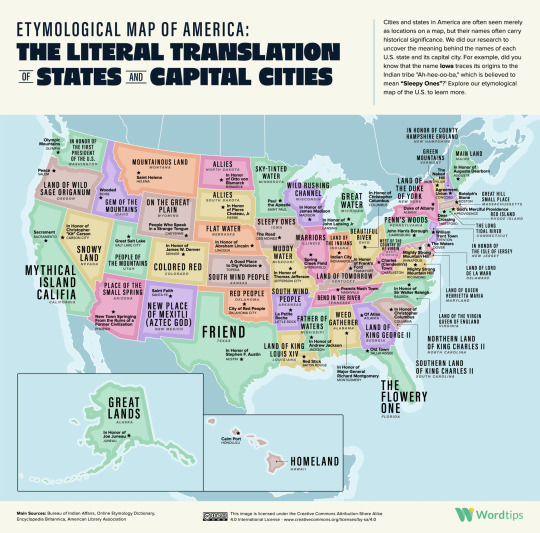
While numerous state names honor Native history or describe geographical features, others carry traces of colonial influence. The Carolinas, for instance, owe their name to King Charles II and his father, Charles I. The territory was initially chartered by Charles II, who bestowed the name in honor of his father. Additionally, the capitals of both Carolinas pay homage to European explorers, with Sir Walter Raleigh and Christopher Columbus lending their names to these cities.
The Literal Translation of Major City Names in the Northwestern U.S.
In addition to the straightforward meanings of city names like ‘Anchorage’ (a place suitable for anchoring) and ‘Portland’ (land surrounding a harbor), the Northwestern U.S. boasts some lesser-known etymologies, both of Native and settler origin.
Honolulu, for instance, derives from the Hawaiian language: ‘hono’ meaning ‘port’ and ‘lulu’ meaning ‘calm.’ Interestingly, the name traces back to British Captain William Brown, who initially named the port Fair Haven upon his arrival in 1794. Before this, Hawaiians referred to the area as Ke ʻAwa O Kou, meaning ‘the harbor of Kou.’
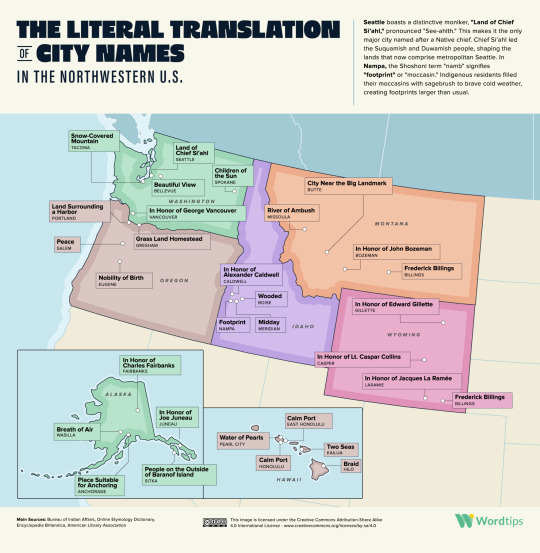
Meanwhile, Boise, Idaho, takes its name from the French word for ‘wooded area.’ However, the name’s origins are influenced by English as well: fur traders passing through the region called it the Wooded River, a name later translated by French trappers.
When surveying the area in the 1830s, the French United States Army officer B.L.E. Bonneville had the final say, choosing French over English.
The Literal Meanings Behind Major City Names in the Southwestern U.S.
Many major cities in the Southwestern U.S. bear names that honor notable individuals. Reno, for instance, pays tribute to Jesse Lee Reno, a Virginia-born Union general who met his demise during the battle of Fox’s Gap. The official announcement regarding the city’s naming stated:
“The name of the new town on the C.P.R.R. at the junction of the contemplated branch road to Virginia City in Nevada, is Reno, in honor of General Reno, who fell gloriously fighting in defense of the flag against the assault of traitors in rebellion.”
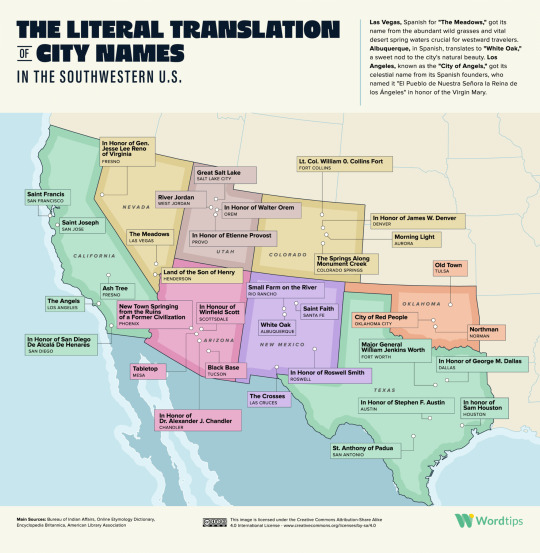
Similarly, Orem, Utah, derives its name from Walter Orem, a prominent figure in mining and railroad development who constructed the state’s inaugural electric railroad. However, the town’s naming was more an act of flattery than gratitude towards Orem’s contributions. In 1919, as the town faced a critical juncture in its expansion efforts, requiring investment for incorporation and the establishment of a networked water system, it was named after Orem in hopes of securing his support. Prior to this, the area had been known as Provo Bench.
The Literal Meanings Behind Major City Names in the Southeastern U.S.
In September 1687, Henri Joutel noted in his writings: “We arrived at the said place called Chicagou which, according to what we were able to learn of it, has taken this name because of the quantity of garlic which grows in the forests in this region.”
Other accounts suggest that the name Chicago may have originated from the Algonquian word sheka:ko:heki, meaning “place of the wild onion,” or possibly from the Ojibwa word for skunk. Regardless of its precise origins, it appears that odor was a prominent characteristic of the area before the establishment of the town of Chicago in 1833.
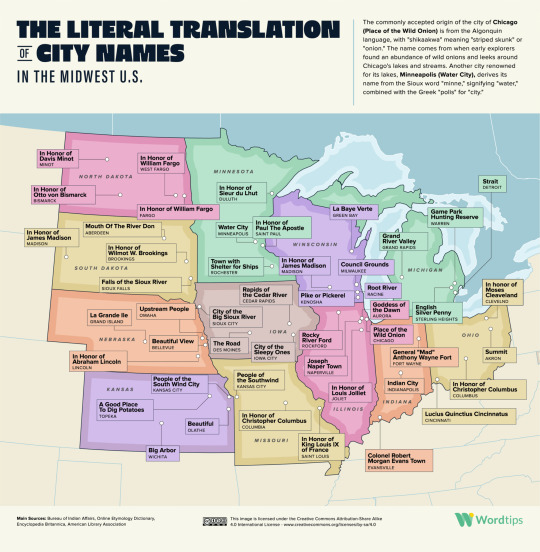
Topeka, on the other hand, translates from the Kansa (Siouan) language as “A Good Place to Dig Potatoes.” The founders chose this name in 1855 with originality in mind. Fry W. Giles, a banker and city founder, described Topeka as “a name not found in the list of post offices of the United States, nor in any lexicon of the English language. It was novel, of Indian origin, and euphonious of sound.”
The Literal Meanings of Major City Names in the Southeastern U.S.
Understanding that Baton Rouge means “red stick” doesn’t require fluency in French. But why was Louisiana named “red stick”? In 1699, French explorer Pierre Le Moyne d’Iberville stumbled upon the area and spotted a reddened pole adorned with sacrificial fish and bear heads by the Native inhabitants. This visual left an impression on d’Iberville, leading him to refer to the area as Baton Rouge when the French colonized it.
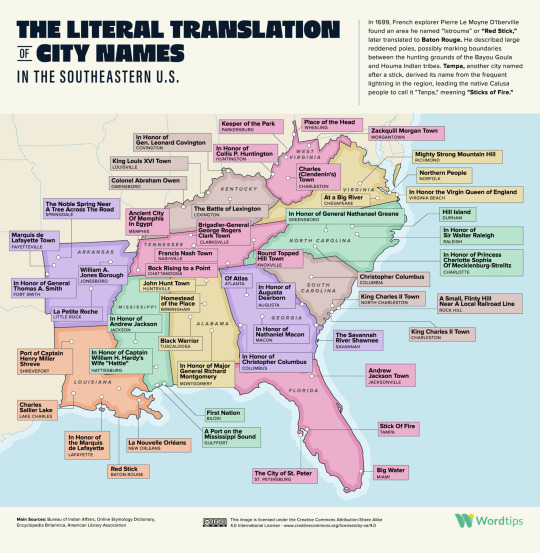
Among the most intriguing place names in the study is Memphis. The city took its name from the ancient Egyptian city of Memphis, which translates to “enduring and beautiful” or “Place of Good Abode,” depending on interpretation. The founders, John Overton, James Winchester, and Andrew Jackson, were less concerned with etymology; they chose the name because both cities stand beside vast rivers.
The Literal Meanings Behind Major City Names in the Northeastern U.S.
Some city name translations in the Northeast are well-known or easy to understand, such as Philadelphia (from the Greek for “brotherly love”) or Portland (the land around a port). Others require a bit more digging.
Would you be able to identify the city name that translates to Botolph’s Stone if it wasn’t labeled on our map? Boston was named after a town in Lincolnshire, England, which, in turn, was named after Botolph, the patron saint of travelers. The second part of the name could derive from “stone” or perhaps from “tun,” the Old English word for village.
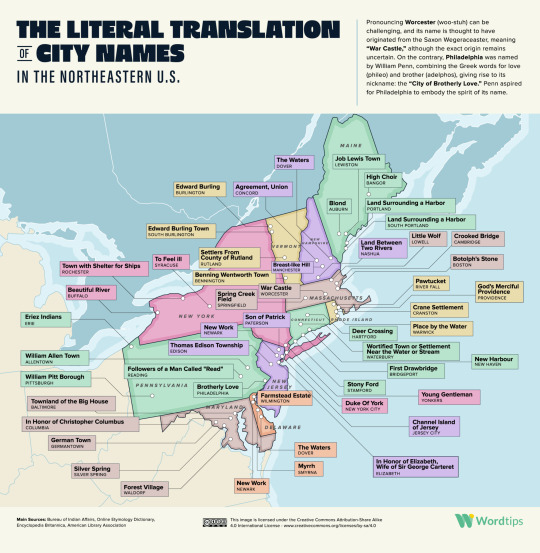
The Dutch colonized New Netherland, which included parts of present-day New York City, Long Island, Connecticut, and New Jersey, with the city of New Amsterdam located on today’s Manhattan Island.
However, in 1664, James II of England, the Duke of York, captured the island, leading to the city receiving its eventual name.
If that sounds odd and European, remember the city was briefly called New Orange when the Dutch briefly recaptured it in 1673.
Methodology:
The WordTips team compiled research from a diverse array of sources, including the Bureau of Indian Affairs, the Online Etymology Dictionary, the Encyclopedia Britannica, the American Library Association, historical records, and regional news reports. The aim was to unveil the literal meanings behind the names of each U.S. state, their respective capital cities, and 178 of the most populated cities scattered across the country.
The investigation delved into various aspects of etymology, considering cases where a state or city was named after a person or significant event, where the words in a location’s name evolved in meaning from an earlier version of English or another language, or according to the significance behind another location after which a U.S. state or city was named.
This project’s research was concluded in January 2024.
3 notes
·
View notes
Text

85K notes
·
View notes
Text
strange that "skinny" means thin. it should mean...skinny. characterized by skin. possessing or characterized by an above average amount of skin. more skin rather than less skin. but somehow it means less skin? preposterous
#*calls my local college English department* yes hello who is in charge here I have a complaint to make#yes a complaint of an etymological nature#what do u mean ur not in charge of that u r literally the English Department
18K notes
·
View notes
Text
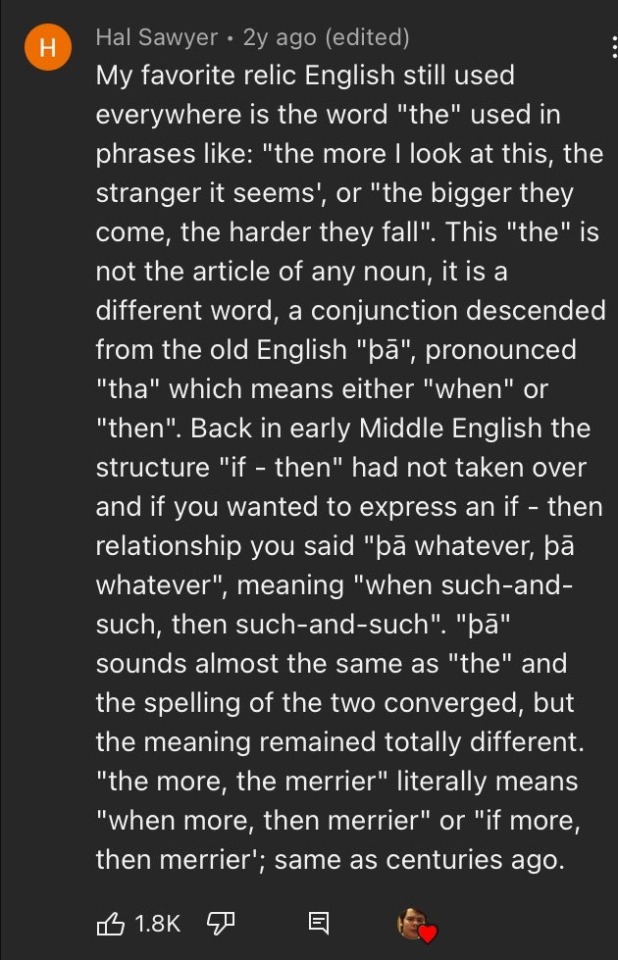
[ID: youtube comment from Hal Sawyer:
My favorite relic English still used everywhere is the word "the" used in phrases like: "the more I look at this, the stranger it seems, or "the bigger they come, the harder they fall". This "the" is not the article of any noun, it is a different word, a conjunction descended from the old English "þā", pronounced "tha" which means either "when" or "then". Back in early Middle English the structure "if - then" had not taken over and if you wanted to express an if - then relationship you said "þā whatever, þā whatever", meaning "when such-and- such, then such-and-such". "þā" sounds almost the same as "the" and the spelling of the two converged, but the meaning remained totally different. "the more, the merrier" literally means "when more, then merrier" or "if more, then merrier'; same as centuries ago.
end ID]
this is so cool
now with added wiktionary link
update, correction to this:

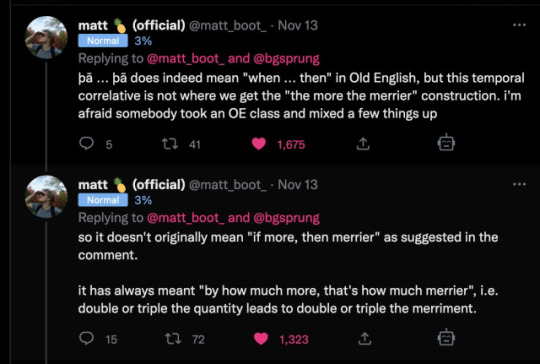
[image description: tweets from user Matt (official) that read, "this is not quite accurate. this 'the' comes from þȳ, the old instrumental case of the definite article. so it's like 'whereby x, therefore y' or 'by how much x, that's how much y.'
þā ... þā does indeed mean 'when ... then' in Old English, but this temporal correlative is not where we get 'the more the merrier' construction. i'm afraid someone took an OE class and mixed a few things up.
so it doesn't originally mean 'if more, then merrier' as suggested in the comment. it has always meant 'by how much more, that's how much merrier' i.e. double or triple the quantity leads to double or triple the merriment." end id.]
thanks to @wovesaxe for this addition
66K notes
·
View notes
Text
Fact: The earliest reliably dated use of the phrase “fucked up” appears in the court records of a US Navy court-martial case from 1863; the way the phrase is used suggests that its meaning was already well known at the time, but this is the first known printed record of it that we can confidently put a date to.
Additional fact: Bram Stoker’s Dracula is set in 1897.
Conclusion: It would not anachronistic for your Dracula fanfic to have a character describe the Count as a fucked up old man.
#media#literature#dracula#bram stoker's dracula#fandom#fanfic#history#language#linguistics#etymology#swearing#sherlock holmes could also say 'fucked up'#he wouldn't#but he could
59K notes
·
View notes
Text
“reify” is the funniest word to me. a prefix and a suffix don’t need a base word to be in a loving and fulfilling relationship
6K notes
·
View notes
Text
little poll
13K notes
·
View notes
Photo

You might have thought card sharks and loan sharks were named after the predatory fish, but apparently there’s a decent chance it’s the other way around from an old Dutch word meaning “person that takes unfair advantage of other people”. Before that they were known in English as a haye or dogfish, which means sometime in the ~1400s enough English sailors started saying “don’t get in the water, it’s infested with those jerks”
27K notes
·
View notes
Text
the metatron is one of my favorite angels simply because the five year old in me is delighted by the fact that there's an actual real angel canonical to several religious texts with a name that makes it sound like a giant evil robot
#🐉#also theres no general consensus on the etymology of its name. they just named that mf like a decepticon for some reason.#angels
8K notes
·
View notes
Text
TIL that the English word “Lord” in the sense of the head of an estate comes from an Old English word of Germanic origins, hlāfweard, later hlāford, later lord.
Normally I wouldn’t remark on my romps through etymology, but “hlafweard” is a compound of hlaf, or loaf, and weard, which means guardian (see also Ward or Warden, etc). Meaning that when you call someone a lord you are calling him an esteemed keeper of the bread.
HEY THERE BREADBOX PETER WIMSEY. LOAF GUARD PALPATINE. BREAD CLIP VETINARI.
Lady also derives from hlaf, but in this case hlafdige or bread kneader. She makes the bread, he monitors it. Women have to do all the work as usual.
Now, the reason I was looking this up was that I wanted to develop a gender-neutral analogue to lord/lady; there are analogues already out there naturally, but the Shivadh must be different and anyway I didn’t like the ones I’d seen suggested online.
Given that the origins of Lord and Lady aren’t all that strongly gendered anyway (they’re about what the person does, not what their gender is), I decided that if a woman is a bread-kneader and a man is a bread-guarder, a nonbinary person should be A BREAD EATER, which would be Hlafetan.
Thus I present to you the gender-neutral analogue to Lord or Lady: Ledan.
ETA: because many have asked, yes this is fine for anyone to use for any reason, I give it to the world. If it’s convenient to link back to my tumblr (or to my author website at extribulum.wordpress.com) that’d be lovely, but don’t feel obliged. Use it in good health, my ledans!
30K notes
·
View notes
Text

15K notes
·
View notes
Text
okay so I was doing a Research™️ about ancient Greek etymology as one does and I found some Things that made me want to Violently Claw My Arms Off please allow me to force feed you my discoveries
So there are 2 words for "not" in ancient Greek, depending on the context: ou and mē. Having introduced himself in the Cyclops episode as " ou tis", or No-man, he then stabs Polyphemus in the eye. When Polyphemus' brothers come to check on him, they say this:
"... surely no man [mē tis] is carrying off your sheep? Surely no man [mē tis] is trying to kill you either by fraud or by force?"
Right after this, after the other cyclopes ditch Polyphemus, Odysseus's inner monologue goes something like this:
"Then they went away, and I laughed inwardly at the success of my clever strategem [metis]." (pronounced mEH-Tis)
Now, there's a difference between mē tis and metis. [mē tis] (pronounced mEH-Tis with a space between the syllables) is the literal translation for "no man". Metis is a word for extreme intelligence/cunning, which is something Odysseus is famous for.
Now, there are several examples of abuse of metis/intelligence in the Odyssey, but I think the juxtaposition between [mē tis], or the concept of anonymity, and metis, or extreme intelligence, is REALLY interesting. Odysseus's adoption of the title "No-man" was characteristic of metis--it was a really smart move that simultaneously hid him from the cyclops and avoided any future consequences. It was a highly effective strategy all wrapped up in a nest little package with a bow on it.
But when he revealed himself as Odysseus of Ithaca, effectively throwing off No-man (anonymity and [mē tis]), that was characterized as idiocy--he's essentially doxxed himself, and now he's doing to (spoiler alert) get tossed around the Mediterranean by Poseidon for the next 10 years.
This is really interesting because it lets you see the parallels/codependency between metis(intelligence) and humility. When Odysseus refused to allow himself to go unnoticed (hubris) he suffered for it. BUT when he declined instant glory/satisfaction (kleos) in order to achieve the long term goal of survival, he was rewarded with Athena's favor (pay attention. This part is important).
And this situation repeats itself MULTIPLE TIMES in the Odyssey--the EXACT SAME THING happens near the end of the book, with the suitors. When. Odysseus is dressed as a beggar and the suitors/Antinious are abusing him, he ACTIVELY CHOOSES not to react--he doesn't stand up and rip off his disguise and start hollering "TIS I, ODYSSEUS OF ITHACA! FEAR MY WRATH"
No. He sits there patiently and waits. He plans and schemes and quietly orchestrates their downfall without alerting them of it. Why? Because he learned his lesson the first time this happened. He buried his rage and adopted what was, according to Grace LA Franz, a more feminine form of metis, weaving a web of destruction for his enemies that ultimately resulted in their total annihilation (see Weaving a Way to Nostos: Odysseus and Feminine Metis in the Odyssey by Grace LaFranz). His patience allowed him to win the whole prize--no questions asked, no 10-year-long-business-trip strings attached--just the sweetness of a full victory. And he is, once again, rewarded with Athena's favor--both in the battle with the suitors and in the aftermath (cleanup/reuniting with Penelope).
This really reinforces the idea in the Odyssey that Odysseus's defining characteristic is not just his intelligence--it's his ability to learn from his mistakes. He used what he learned at the Lotus Eaters Island against Polyphemus--the Lotus Eaters drugged his men, so he drugged Polyphemus. He used what he learned from Circe and Polyphemus against the suitors--Circe used false sweetness and honeyed words to lure his men into a trap, so that's exactly what he did to the suitors. His hubris on Polyphemus' island cost his whole crew their lives, so he intentionally left well enough alone until the right time. He didn't just learn from his failures--he turned them into BATTLE STRATEGY.
i don't care what anyone says that is completely totally and objectively awesome
#Odysseus is a certified baddie 112% of the time#he's literally the coolest you can't convince me otherwise#there's a reason that literally everyone has a crush on him#even the lesbians#its the wordplay. his words#read me a poem in iambic pentameter you bloody stinky man#literally everyone: his sad wet vibes and dark undereye circles have captivated me entirely#odysseus#the odyssey#tagamemnon#odysseus x penelope#telemachus#epic the musical#the cyclops saga#odysseus of ithaca#poseidon#etymology#ancient greece#ancient history
2K notes
·
View notes
Text
A Magical Taxonomy
Warlock: from wær (old English, “pact/oath”) + loga (proto-Germanic, “liar”) + hard “-ck” (Scottish English); Oathbreaker (contextually; breaker of Baptismal Oaths; hence also Apostate)
Wizard: from Wis (old English, “knowledgeable”) + -ard (same, “too much of”); Possessor of too much knowledge
Witch: from weyk (proto-indo-European, “apart, separated, different”)[connotations akin to Latin’s “Sacre”]; Sacred Outsider
Sorcerer: from Sors (Latin, “Fate”) and Ser (same,“to bind”); Fate Manipulator
Druid: from dru (proto-Celtic, “Oak”) + weyd (same, “to see”); Oak-Seer, or Tree-Knower
Cleric: from kleros (Ancient Greek, “lots/ casting lots/ drawing lots”) [contextually; public servants were selected by drawing lots, as opposed to, say, voting]; Public Servant / Clerk
Bard: from bard (proto-Celtic, “Bard”); Bard
#Magic#etymology#dnd#history of the occult#occult#witch#Wizard#sorcerer#warlock#cleric#bard#bard bard#bard bard bard#bard bard bard bard#it’s bards all the way down
5K notes
·
View notes
Text
Transcendentalism is a hard word to grasp, so it's important to look at the etymology of it so you can parse its meaning.
Trans - to be beyond or across
Cen - one hundred
Dental - Teeth
Ism - the belief of
So taken all together, transcendentalism means "the belief that one should have beyond one hundred teeth"
Hope this helps!
#thank you to one of my classmates for making this joke in english a little while back#transcendentalism#transcendental#funny#etymology
1K notes
·
View notes
